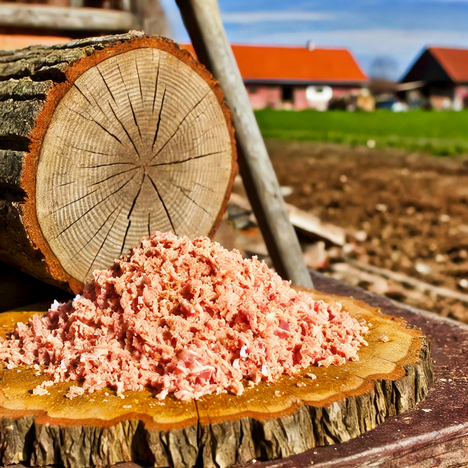Pork liver hydrolyzate

What is pork liver hydrolyzate?
Pork liver hydrolysate is created through the process of hydrolysis, where pork liver is treated with water, enzymes or acids to break down the large protein molecules into smaller peptides and free amino acids. This process not only makes the end product easier to digest, but also enhances the flavor and aroma, making it a popular additive in dog food.
Benefits of pork liver hydrolysate for dogs
Improved digestibility
The small peptides and amino acids obtained through hydrolysis can be more easily absorbed and utilized by dogs. This is particularly beneficial for dogs with sensitive stomachs or digestive problems.
High acceptance and flavor intensity
The distinct aroma and strong flavor of pork liver hydrolysate can significantly increase the acceptance of the food by picky eaters. It makes the food more attractive and palatable to dogs.
Potential health benefits
Pork liver is rich in vitamins and minerals, including vitamin A, B vitamins and iron. Although the hydrolysis process can alter the nutritional composition, some of these health-promoting ingredients are retained.
Disadvantages of pork liver hydrolysate
Potential hypersensitivity reactions
Despite the hydrolysis process reducing the likelihood of allergies, some dogs may still be sensitive to certain peptides or amino acids.
Quality and processing
The quality of pork liver hydrolysate can vary, depending on the origin of the pork liver and the specific hydrolysis process. Some processing methods may also result in a loss of nutrients.
Costs
The production of hydrolysates is often more costly than the processing of conventional meat ingredients. This can be reflected in higher prices for end products containing pork liver hydrolysate.
Recommendations and precautions
If you are considering feeding your dog food containing pork liver hydrolysate, consider the following points:
- Allergy tests: If your dog is prone to food intolerances, it may be useful to have an allergy test carried out before feeding.
- Product quality: Choose products from manufacturers that are known for their high quality and transparent manufacturing processes.
- Introduction and observation: Introduce new foods gradually and observe your dog for signs of intolerance or digestive problems.
Pork liver hydrolysate offers an interesting opportunity to improve the acceptability and digestibility of dog food, especially for fussy eaters or dogs with digestive difficulties. While the benefits such as improved flavor intensity and potential health benefits are attractive, the potential drawbacks and the need for careful selection and introduction should not be underestimated. Ultimately, the decision as to whether pork liver hydrolysate should be part of your dog's diet depends on individual factors such as health status, nutritional needs and personal preferences.
If you notice any signs of hypersensitivity or poisoning in your dog, you should see your vet immediately. We are not a substitute for a vet, but we try to be as accurate as possible. Every dog reacts differently and we recommend you get a second opinion or consult your vet if in doubt.
Stay healthy and take good care of your four-legged friend!😊